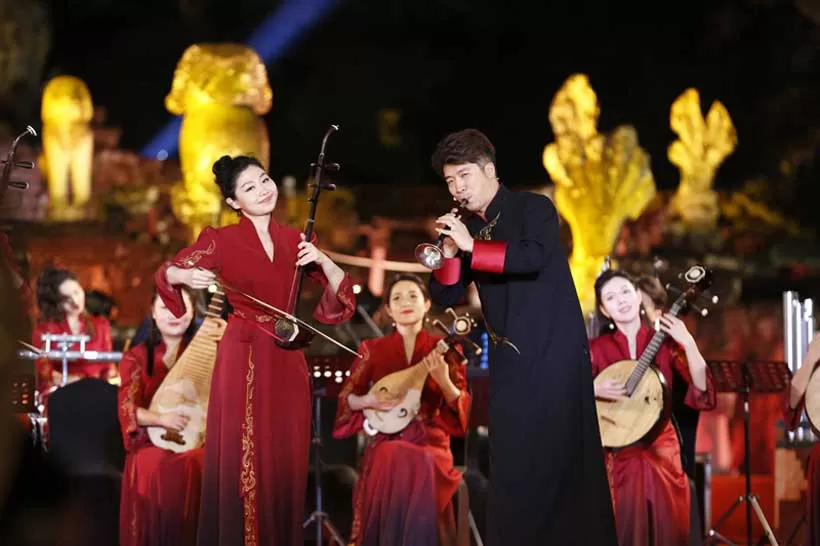The Cambodia-China People-to-People Exchange Year, officially commenced in January 2024, marks a significant milestone in the cultural diplomacy between Cambodia and China. The event was launched with a grand ceremony at the Terrace of the Elephants in the UNESCO-listed Angkor Archaeological Park, reflecting the historical significance and cultural heritage of the partnership.
In 2023, Cambodia and China elevated their bilateral relations to new height under the framework “Diamond Hexagon Cooperation” that is centered on six priority areas, including people-to-people exchanges.
In a message celebrating the 2024 Cambodia-China People-to-People Exchange Year, Cambodian Prime Minister Hun Manet said that, “I’m optimistic that the 2024 Cambodia-China People-to-People Exchange Year will provide a new great opportunity to attract more Chinese tourists and investors to Cambodia, and the bonds of solidarity, friendship and diamond cooperation between our two countries and peoples will be even stronger”.
Cultural diplomacy refers to the “exchange of ideas, information, art, language and other aspects of culture among nations and peoples in order to foster mutual understanding”. In this sense, the People-to-People Exchange Year is deemed as an essential pillar for cultural interactions between Cambodia and China as a way to foster mutual understanding and forging strong bilateral ties. It also helps to promote the richness and uniqueness of Cambodian culture and history in the international platform.
Furthermore, it is a crucial framework for the two countries to co-organize a variety of cultural activities including art exhibitions, traditional music, dance performances, and culinary festivals that clearly demonstrate their rich heritage. These events, for instance, “When Shaolin Meets Bokator at Angkor” event, not only highlight the cultural diversity of Cambodia and China but also strengthen cultural diplomacy as it helps boost mutual appreciation and understanding among the peoples of the two countries.
On top of this, at the core of People-to-People Exchange Year, it lies the potential for creating greater opportunities for different elements from societies, including youths, artists, academic professionals and local communities. This inclusiveness certainly reinforces social bonds and enhances cooperation and friendship, plus strengthens grassroots ties that are so crucial to nurture inter-state relations in view of long-term perspective between the respective countries.
In fact, the Cambodian government has recognized the importance of cultural diplomacy in fostering economic growth and enhancing national identity. As such, within the framework of People-to-People Exchange, Phnom Penh and Beijing can encourage joint cultural tourism initiatives to showcase the diverse heritage of both countries. Additionally, they can further promote cultural exchange programs, foster bilateral artistic collaborations, and facilitate educational initiatives in an attempt to promote mutual understanding. This approach will not only deepen cultural links but also yield economic benefits through increased tourism and the exchange of expertise in various cultural and artistic domains.
Definitely, the People-to-People Exchange Year will provide economic stimulus, especially in the areas of tourism and hospitality. Both nations can stand to benefit significantly from increased tourist arrivals by encouraging mutual visits and promoting cultural exchanges. This initiative will contribute to the resurgence of further two-way travel between Cambodia and China, injecting vitality into economic growth and foster stronger cultural connections not only for Cambodia, but also for the region.
Tourism industry is one of Cambodia’s key economic backbones. It has driven billions of dollars in revenue and generated numerous job opportunities in Cambodia. In 2019, the industry employed 630,000 individuals and brought in 4.9 billion USD in revenue, accounting for 18.2 percent of the GDP. In 2023, Cambodia welcomed approximately 540,000 Chinese visitors.
With the inauguration of People-to-People Exchange Year, Cambodia is expected to boost further Chinese tourist arrivals and investment. According to the Cambodian Ministry of Tourism report released in April, China is the third largest source of international tourist arrivals to the Kingdom in the first quarter of 2024.
Noticeably, Cambodia and China’s trade relationship has seen significant growth, with Chinese investment increasing significantly in recent years. In 2023, Chinese investment surged to 3.2 billion USD, making China the top investor in Cambodia. The trade volume between the two countries has also increased, reflecting their strong commercial ties and economic partnership. In 2023, the two countries saw their trade volume increase to $12.26 billion, showcasing a 5 percent growth compared to 2022.
It is believed that this initiative along with other free trade pacts and blocks in place will become a key driver of tourism promotion and economic cooperation, not only drawing tourists but also Chinese investors to the Kingdom, leading to the job creation and infrastructure development. Consequently, it will contribute to the long-term economic growth of Cambodia.
The Cambodia-China People-to-People Exchange Year also stands as a strategic initiative to strengthen bilateral relations between Phnom Penh and Beijing in a complex global geopolitical landscape. With the emphasis on people-to-people interactions, the initiative builds a robust foundation for enduring diplomatic relations and signals a commitment to peaceful cooperation and mutual prosperity.
Looking ahead, the People-to-People Exchange Year lays the groundwork for sustained cultural engagement and long-term cooperation. The enhanced cultural diplomacy resulting from this initiative will set the stage for building a high-quality, high-standard Cambodia-China community with a shared future in the contemporary era.
As both countries continue to navigate the complex dynamics of globalization, cultural diplomacy remains a strategic avenue for promoting peace, understanding, and shared prosperity in the region and beyond.
